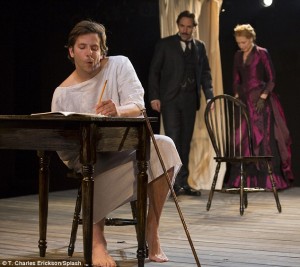In today’s Wall Street Journal drama column I have enthusiastic words for the Broadway revival of The Elephant Man. Here’s an excerpt.
* * *
First “Side Show,” now “The Elephant Man”: This would seem to be Broadway’s Year of the Circus Freak. But while “Side Show” is a slick, sentimental musical that uses the story of a famous pair of conjoined twins to preach a progressive sermon about how it’s O.K. to be different, Bernard Pomerance’s 1977 play about a congenitally deformed man whom Victorian England clasped to its collective bosom is a vastly more serious affair. Scott Ellis’ new production, which originated at the Williamstown Theatre Festival, is the play’s second Broadway revival, and while it wouldn’t have happened were it not for the remunerative presence of Bradley Cooper, the Sexiest Man Alive, it’s worth seeing anyway. Not only is Mr. Ellis’ staging distinguished, but “The Elephant Man” itself is by no means a mere tour de force for a good-looking actor.…
 “The Elephant Man” is a fictionalized recounting of the life of Joseph Merrick (Mr. Cooper), who suffered from a rare condition that caused his skin to resemble the hide of an elephant and distorted his body in other horrifically unsightly ways. Spurned by his family, he spent four years in a workhouse, then submitted to being put on exhibition by crooked showmen. He was rescued by Frederick Treves (Alessandro Nivola), a surgeon who took him into the London Hospital and looked after him for the rest of his brief life. When Dr. Treves made a public appeal to raise funds for his care, the young man became a cause célèbre and drew the attention of England’s high society, for even though he was grotesquely disfigured, his mind functioned normally and he was emotionally sensitive.
“The Elephant Man” is a fictionalized recounting of the life of Joseph Merrick (Mr. Cooper), who suffered from a rare condition that caused his skin to resemble the hide of an elephant and distorted his body in other horrifically unsightly ways. Spurned by his family, he spent four years in a workhouse, then submitted to being put on exhibition by crooked showmen. He was rescued by Frederick Treves (Alessandro Nivola), a surgeon who took him into the London Hospital and looked after him for the rest of his brief life. When Dr. Treves made a public appeal to raise funds for his care, the young man became a cause célèbre and drew the attention of England’s high society, for even though he was grotesquely disfigured, his mind functioned normally and he was emotionally sensitive.
Mr. Pomerance has turned his tale into a parable modeled on “Pygmalion.” Just as Henry Higgins, Shaw’s haughty professor of phonetics, endeavors to turn the grubby Eliza Doolittle into a “real lady,” so does the fictional Dr. Treves school the fictional Merrick in the priggish ways of middle-class respectability, revealing in the process that his own values are as false as the Christianity in which he feigns faith. (Merrick: “If your mercy is so cruel, what do you have for justice?” Treves: “I am sorry. It is just the way things are.”) That’s the point of “The Elephant Man,” whose author, like Shaw before him, holds conventional morality in contempt, going so far as to imply that Merrick might have been better off had he not fallen into the hands of a Victorian hypocrite like Treves.
While such notions are as fashionable today as they were in 1977, I take leave to doubt that any of the real people portrayed in “The Elephant Man,” least of all Merrick, subscribed to them. Nevertheless, Mr. Pomerance has used them as the basis for a play that is extremely smart, if sometimes heavy-handed….
Mr. Cooper, despite his relative lack of stage experience, proves to be a very good actor, one so fully submerged in his part that the audience at the preview I attended didn’t applaud his first entrance, immediately recognizable though he was. His performance is simple, direct and convincing in every way….
* * *
Read the whole thing here.
